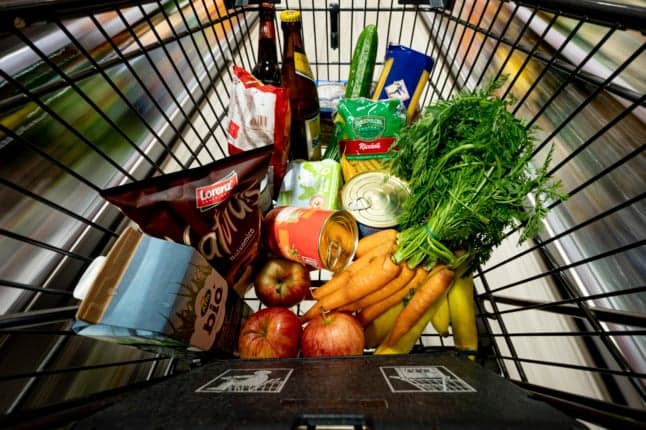What has caused inflation in Germany to slow to 3.8 percent?

Preliminary figures show that German inflation has slowed to its lowest level since August 2021. What's behind the dip?
German inflation slowed again in October, preliminary data showed Monday, as the upwards pressure on consumer prices continued to ebb in Europe's largest economy.
The indicator showed a 3.8-percent year-on-year rise in prices in October, down from 4.5 percent in the previous month, according to federal statistics agency Destatis.
The figure was at its lowest point since August 2021, when inflation was first being driven up by widespread supply bottlenecks as the global economy emerged from the coronavirus pandemic.
READ ALSO: German inflation drops to lowest level since start of war in Ukraine
Moscow's invasion of Ukraine in 2022 and the consequent surge in energy prices as deliveries of gas to Europe from major supplier Russia dwindled then supercharged prices.
Inflation in Germany reached its peak of more than 10 percent towards the end of last year, but has since slowed more or less steadily as energy prices have settled.
Why has inflation dipped so much since last year?
Prices for energy fell in October by 3.2 percent year-on-year, resulting in a strong "dampening" effect on inflation, according to Destatis.
The high baseline for energy prices last year went some way to explaining the fall, according to Fritzi Köhler-Geib, chief economist at German public lender KfW.
"Exactly one year ago, consumer energy prices reached their temporary peak," Köhler-Geib said.
This effect would "weaken in the coming months and even reverse", meaning inflation could "see a significant rise" again at the turn of the year, she said.
The trend in inflation was however "right", Köhler-Geib said, as the European Central Bank has raised interest rates steeply to rein in consumer price rises.
"However, in view of the geopolitical situation, there is an increased probability of new supply-side shocks," she warned, in a reference to the conflict between Israel and Hamas, which has sent ripples through oil markets.
Comments
See Also
German inflation slowed again in October, preliminary data showed Monday, as the upwards pressure on consumer prices continued to ebb in Europe's largest economy.
The indicator showed a 3.8-percent year-on-year rise in prices in October, down from 4.5 percent in the previous month, according to federal statistics agency Destatis.
The figure was at its lowest point since August 2021, when inflation was first being driven up by widespread supply bottlenecks as the global economy emerged from the coronavirus pandemic.
READ ALSO: German inflation drops to lowest level since start of war in Ukraine
Moscow's invasion of Ukraine in 2022 and the consequent surge in energy prices as deliveries of gas to Europe from major supplier Russia dwindled then supercharged prices.
Inflation in Germany reached its peak of more than 10 percent towards the end of last year, but has since slowed more or less steadily as energy prices have settled.
Why has inflation dipped so much since last year?
Prices for energy fell in October by 3.2 percent year-on-year, resulting in a strong "dampening" effect on inflation, according to Destatis.
The high baseline for energy prices last year went some way to explaining the fall, according to Fritzi Köhler-Geib, chief economist at German public lender KfW.
"Exactly one year ago, consumer energy prices reached their temporary peak," Köhler-Geib said.
This effect would "weaken in the coming months and even reverse", meaning inflation could "see a significant rise" again at the turn of the year, she said.
The trend in inflation was however "right", Köhler-Geib said, as the European Central Bank has raised interest rates steeply to rein in consumer price rises.
"However, in view of the geopolitical situation, there is an increased probability of new supply-side shocks," she warned, in a reference to the conflict between Israel and Hamas, which has sent ripples through oil markets.
Join the conversation in our comments section below. Share your own views and experience and if you have a question or suggestion for our journalists then email us at [email protected].
Please keep comments civil, constructive and on topic – and make sure to read our terms of use before getting involved.
Please log in here to leave a comment.